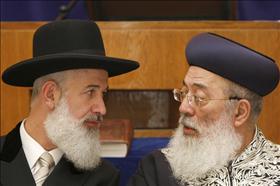Birthday party at the Knesset
Chief Rabbinate turns 90: A sad celebration
Hiddush: The festivities are among the most embarrassing and unnecessary events held at the Knesset lately
22/03/2011 12:42
Tags: Chief Rabbinate · Israel · Hiddush · haredim

Chief Rabbis, Shlomo Amar and Yona Metzger at the Yeshurun synagogue in Jerusalem. 18.07.2009. Photography: Abir Sultan, Flash 90
On Tuesday, March 22, the Knesset held a festive ceremony to mark the 90th anniversary of the Chief Rabbinate. In response to the celebration the head of Hiddush – Freedom of Religion for Israel, Rabbi Uri Regev said: “The 90th anniversary celebrations for the Chief Rabbinate are among the most embarrassing and unnecessary events held at the Knesset lately. It’s not a party that the rabbinate needs, but rather a funeral that will put an end to the shame. Considering the growing detachment between it and a majority of the population – I doubt it would be a well-attended funeral.”
According to Regev, “the Chief Rabbinate has been characterized in recent years by the fact that the rabbis heading it are from the second tier and below, the emissaries of the most radical of haredi rabbis. The contempt of the haredim for the institutions of the Chief Rabbinate finds expression in, among other things, the fact that among those who are sent to serve there are rabbis whose names have been tied to sex scandals and criminal cases.
“The rabbinate,” Regev added, “fails again and again when it comes to providing solutions to national challenges, turns its back on the religious meaning of Zionism, makes the conversion proceedings more arduous and doesn’t dare to deal bravely and openly with the phenomenon of nullifying conversions. It harms the interest of the State of Israel and the Jewish people with its battles against the non- Orthodox Judaism that constitutes the great majority of Diaspora Jewry. It does not encourage organ transplants and saving lives, does not work for tikkun olam and social justice, does not promote respect for and sensitivity to the needs of the non-Jewish public, and also does not contend with the phenomena of ethnic discrimination. It does not come out against corruption and theft of the public’s money under the auspices of religion, and naturally does not preach respect for the rule of law and the institutions of democracy.”
Regev noted that, “lately an initiative came up in the Knesset to extend the chief rabbis’ term of service, but the truth is that the law that is truly needed is one that will make the previous elections to the rabbinate also the final ones, and relieve us of its yoke.”
The Web site Kikar Ha-Shabbat reports that in the speech he
It’s not a party that the rabbinate needs, but rather a funeral that will put an end to the shame
gave at the ceremony, Sephardic Chief Rabbi Shlomo Amar said: “Conversion must remain in the hands of the rabbinate.” He also called on all of the Knesset members to vote for the conversion bill, so as to resolve most of the problems with this sensitive issue. “You can’t have a people without the rabbinate, just as the rabbinate cannot manage without the people,” Amar said.
The minister of religious services, Yaakov Margi, said: “The Chief Rabbinate is fighting for the Jewish identity of the State of Israel in the face of elements that are trying to weaken it. Society in Israel has, since the state’s establishment – and today more than ever – been in a constant battle over determining the Jewish identity of the State of Israel. As such, the Chief Rabbinate of Israel has greater importance precisely in our own time, as opposed to the trends that are being conceived both in the Jewish people and by parliamentary and extra-parliamentary elements that are trying to weaken the standing of the Chief Rabbinate of Israel.”
Margi called for “bolstering the status of the chief rabbis in the area of halakhic ruling: the halakhic opinion will be taken into account as an opinion before any religious legislation of one kind or another.”
Rubinstein: Stop segregation
Supreme Court Justice Elyakim Rubinstein expresses the hope that municipal rabbis will stop being appointed according to an ethnic key. In his opinion, there is no need whatsoever today for an Ashkenazi rabbi and a Sephardic rabbi side by side. The Web site News1 writes that Rubinstein makes these remarks tangentially in a High Court of Justice verdict that cancelled the tender for appointing a neighborhood rabbi in Safed. The High Court ruled that Rabbi Raphael Cohen had been appointed contrary to the directives in the circular issued by the director- general of the Religious Services Ministry, and therefore his appointment must be rescinded.
Justice Rubinstein, who is Orthodox, writes: “Is it not time to remove outside the camp the distinction in the law and in the political dialog (not to say, wheeling and dealing), and even beyond it, in appointing rabbis and even rabbinic court judges, between Ashkenazim and Sephardim? ‘Is there not one father to us all’ (Malachi 2:10) and there is no reason why there should not be ‘one rabbi to us all.’”